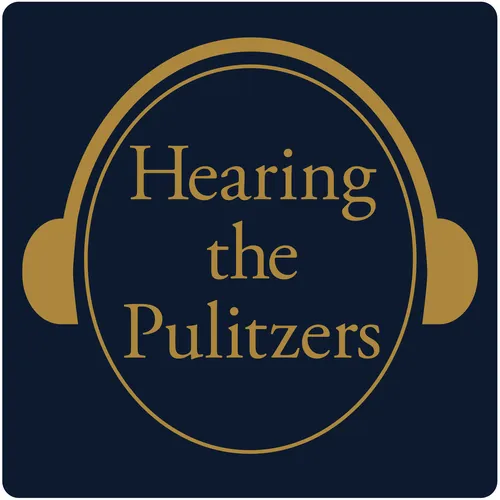
Hearing The Pulitzers
Hearing the Pulitzers: A piece-by-piece, episode-by-episode exploration of the winners of the Pulitzer Prize in Music with hosts Andrew Granade and David Thurmaier.
- Update frequency
- every 25 days
- Average duration
- 28 minutes
- Episodes
- 67
- Years Active
- 2020 - 2025

Episode 45 - 1987: John Harbison, The Flight Into Egypt
In this episode Dave and Andrew discuss a composer known for his eclecticism, who writes music that features the influence of jazz, Stravinskian neoclassicism, Schoenbergian serialism, and a variety …

Episode 44 - 1986: George Perle, Wind Quintet IV
In this episode, Dave and Andrew discuss someone they know primarily as a music theorist. George Perle is celebrated for his theoretical work on twelve-tone theory and Alban Berg's music, but how doe…

Episode 43 -1985: Stephen Albert, Symphony RiverRun
In this episode, Dave and Andrew continue discussing the streak of Neo-Romantic winners of the Pulitzer Prize in music with Stephen Albert's Symphony RiverRun. But will this symphony win them over?
…

Episode 42 - 1984: Bernard Rands, Canti del Sole
In this episode, Dave and Andrew discuss a composer associated with New Romanticism. But is that label reductive or does it accurately describe Bernard Rands's music? How about this song cycle based …

Bonus: An Interview with Ellen Taaffe Zwilich
In this special bonus episode, Dave and Andrew talk with Pulitzer Winner Ellen Taaffe Zwilich. What did she learn studying at Florida State University and with former Pulitzer winners Roger Sessions …

Episode 41 - 1983: Ellen Taaffe Zwilich, Symphony No.1 (Three Movements for Orchestra)
In this episode, Dave and Andrew discuss the first female Pulitzer Prize winner, Ellen Taaffe Zwilich, who wrote a symphony of all things. What will they think about the first symphony to win the pri…

Episode 40 - 1982: Roger Sessions, Concerto for Orchestra
In this episode, Dave and Andrew discuss the third winner of the Pulitzer Prize to study with Horatio Parker at Yale, Roger Sessions, for his Concerto for Orchestra. Since the other two winners were …

Episode 39 - 1981: No Winner
In this episode, Dave and Andrew cover the fourth and final time (so far) that the Pulitzer Board decided not to award a music prize. Unlike 1965, which was the last year they didn't award the prize,…

Episode 38 - 1980: David Del Tredici, In Memory of a Summer Day
In this episode, Dave and Andrew discuss a composer Aaron Copland called a "rare find among composers — a creator with a truly original gift." Will they agree with Copland about David Del Tredici's I…

Episode 37 - 1979: Joseph Schwantner, Aftertones of Infinity
In this episode, Andrew and Dave explore a composer they first encountered with his music for wind band. In his Pulitzer-winning work, Schwantner fashioned a composition critics have described as cre…

Episode 36 - 1978: Michael Colgrass, Déjà Vu
In this episode, Dave and Andrew record their first live podcast event! In front of the Kansas City Conducting Symposium, they discuss an unusual work for the Pulitzers in that Michael Colgrass featu…

Episode 35 - 1977: Richard Wernick, Visions of Terror and Wonder
In this episode, Dave and Andrew discuss a Pulitzer winner that has so fallen out of the repertoire that there is no commercially available recording. But that doesn't mean there aren't interesting t…

Episode 34 - 1976: Ned Rorem, Air Music
In this episode, Dave and Andrew explore a composer better known for his songs who won for an orchestral work, Ned Rorem. They may enjoy The Nantucket Songs but what will they think about Air Music?
…

Episode 33 - 1975: Dominick Argento, From the Diary of Virginia Woolf
In this episode, Dave and Andrew explore the first song cycle to ever win the Pulitzer Prize, Dominick Argento's From the Diary of Virginia Woolf. Argento always remarked that his music balanced betw…

Episode 32 - 1974: Donald Martino, Notturno
In this episode, Dave and Andrew discuss a composer who is usually considered a 12-tone composer, but who also rejected labels. He famously told the New York Times in 1997 that "If anyone writes prog…

Episode 31 - 1973: Elliott Carter, String Quartet No. 3
In this episode, Dave and Andrew revisit Elliott Carter, who won his first Pulitzer in 1960. They awarded his String Quartet No. 2 two big thumbs up. Will they be as enthusiastic about Carter's Strin…

Episode 30 - 1972: Jacob Druckman, Windows
In this episode, Dave and Andrew look through Windows at Jacob Druckman's compositional style and legacy in American music. Druckman taught at Yale and the Aspen Music Festival for years, shaping gen…

Episode 29 - 1971: Mario Davidovsky, Synchronisms No. 6
In this episode, Dave and Andrew discuss the first episode they have a personal connection to as Andrew has performed Mario Davidovsky's Synchronisms No. 6. How does Dave react to the third music win…

Episode 28 - 1970: Charles Wuorinen, Time’s Encomium
In this episode, Dave and Andrew discuss the first fully electronic work to ever win a Pulitzer Prize, even though it was the only electronic work its composer ever wrote. Did Charles Wuorinen set a …

Episode 27 - 1969: Karel Husa, String Quartet No. 3
In this episode, Dave and Andrew explore a composer renowned today for his works for wind band, but celebrated during his lifetime for music that was, in Nicolas Slonimsky's famous phrase, "oxygenate…